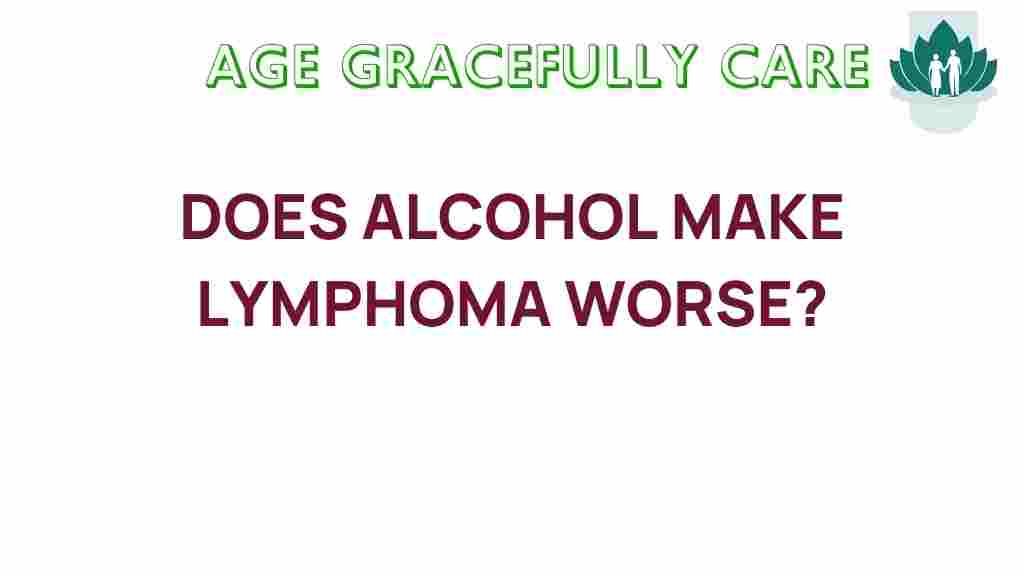Unraveling the Link: Does Alcohol Intensify Lymphoma Risks?
In recent years, there has been growing concern about the potential health risks associated with alcohol consumption, particularly in relation to various types of cancer. Among these, lymphoma—a term that encompasses a group of cancers affecting the lymphatic system—has garnered significant attention. This article aims to explore the connection between alcohol and lymphoma, examining research findings, patient care implications, and lifestyle choices that can influence disease management.
The Lymphatic System and Its Importance
The lymphatic system plays a crucial role in the body’s immune function. It helps in the production and circulation of lymph, a fluid that contains infection-fighting white blood cells. When this system is compromised, it can lead to various health issues, including lymphoma.
Understanding Lymphoma
Lymphoma is categorized primarily into two types: Hodgkin lymphoma (HL) and non-Hodgkin lymphoma (NHL). Both types can affect individuals differently, and the causes remain largely unclear, although various risk factors have been identified.
Alcohol and Its Impact on Health
Alcohol consumption is a common lifestyle choice for many, but its effects on health cannot be understated. Research has consistently shown that excessive alcohol intake can lead to numerous health risks, including liver disease, cardiovascular issues, and cancer.
The Connection Between Alcohol and Lymphoma
Several studies have explored the relationship between alcohol consumption and lymphoma risk. Key findings suggest that:
- Moderate to high alcohol intake may increase the likelihood of developing non-Hodgkin lymphoma.
- Hodgkin lymphoma patients who consume alcohol may experience exacerbated symptoms, particularly pain associated with lymph nodes.
- Alcohol can impair the immune system, potentially increasing susceptibility to various cancers, including lymphoma.
Research Findings on Alcohol and Lymphoma
Many researchers have dedicated their efforts to understanding how alcohol affects lymphoma risk. Notable findings include:
- A meta-analysis published in the *Journal of Cancer Epidemiology* concluded that individuals who consume alcohol regularly have a statistically significant higher risk of developing non-Hodgkin lymphoma.
- Studies indicate that individuals with a history of heavy drinking may have altered immune responses, which can influence the development of lymphoma.
- Some research suggests that the type of alcohol consumed (beer, wine, or spirits) may also play a role in risk levels.
Health Risks and Lifestyle Choices
Understanding the health risks associated with alcohol consumption is vital for effective disease management, particularly for those at risk of lymphoma. Here are some lifestyle choices to consider:
1. Moderation is Key
Limiting alcohol intake is crucial. Health organizations recommend that if you choose to drink, it should be done in moderation:
- For women: Up to one drink per day
- For men: Up to two drinks per day
2. Opt for Healthier Alternatives
Consider alternatives to alcoholic beverages, such as:
- Non-alcoholic beers and wines
- Mocktails made with fresh fruits and herbs
- Sparkling water with citrus
3. Stay Informed About Research Findings
Keeping abreast of the latest research can help guide your lifestyle choices. For more information on recent studies, visit here.
4. Focus on Overall Health
Adopting a holistic approach to health can enhance your immune system and reduce cancer risks:
- Maintain a balanced diet rich in fruits, vegetables, and whole grains.
- Engage in regular physical activity.
- Prioritize adequate sleep and stress management.
Cancer Treatment and Patient Care
For individuals diagnosed with lymphoma, understanding the interplay between alcohol and their condition is essential for effective treatment and patient care.
1. Communicate with Healthcare Providers
Patients should openly discuss their alcohol consumption with their healthcare team. This dialogue can help tailor treatment plans that consider the potential impacts of alcohol on their health.
2. Monitor Symptoms
Patients should be vigilant about any symptoms that may arise from alcohol consumption, especially those related to lymphoma, such as:
- Pain in lymph nodes
- Fatigue
- Unexplained weight loss
3. Adhere to Treatment Plans
Following prescribed treatments and lifestyle recommendations can help improve outcomes for lymphoma patients. This includes being mindful of alcohol intake throughout the treatment process.
Troubleshooting Tips for Patients
If you’re a lymphoma patient or someone at risk, consider these troubleshooting tips regarding alcohol consumption:
1. Identifying Triggers
Keep a journal to track when and why you consume alcohol. Identifying triggers can help you make informed decisions about your drinking habits.
2. Seek Support
If reducing alcohol consumption proves challenging, consider seeking support from:
- Support groups
- Therapists specializing in addiction
- Friends and family
3. Educate Yourself
Knowledge is power. Educate yourself about the risks associated with alcohol and lymphoma through reputable sources, such as the American Cancer Society.
Conclusion
The link between alcohol and lymphoma is complex and warrants careful consideration. While research suggests that alcohol consumption can increase the risk of developing lymphoma and exacerbate symptoms in patients, lifestyle choices play a significant role in disease management and overall health. By making informed decisions about alcohol intake and prioritizing health, individuals can better navigate their risks regarding lymphoma. Always consult with healthcare providers to tailor a personalized approach to your health and well-being.
This article is in the category Health and created by AgeGracefullyCare Team
